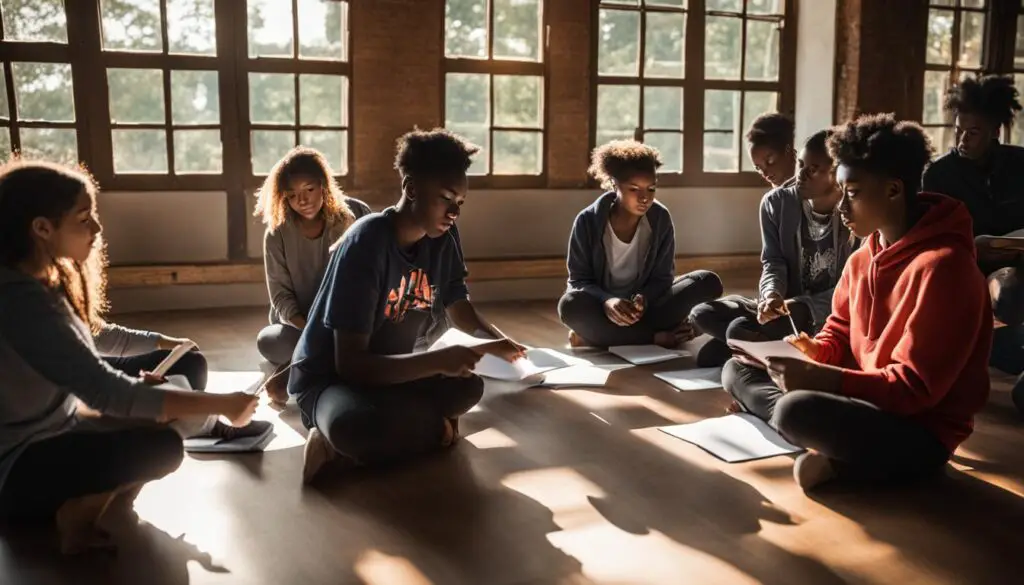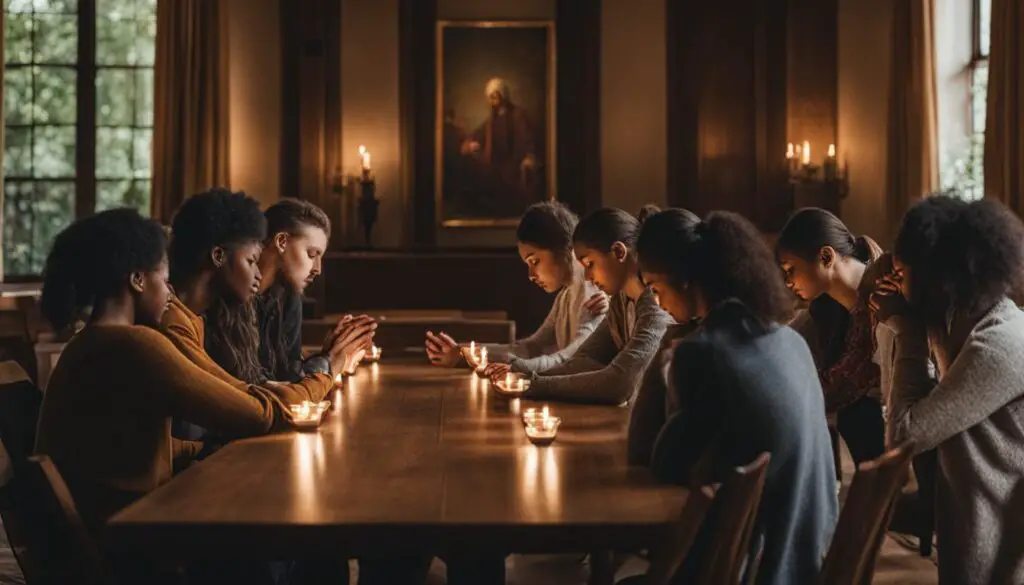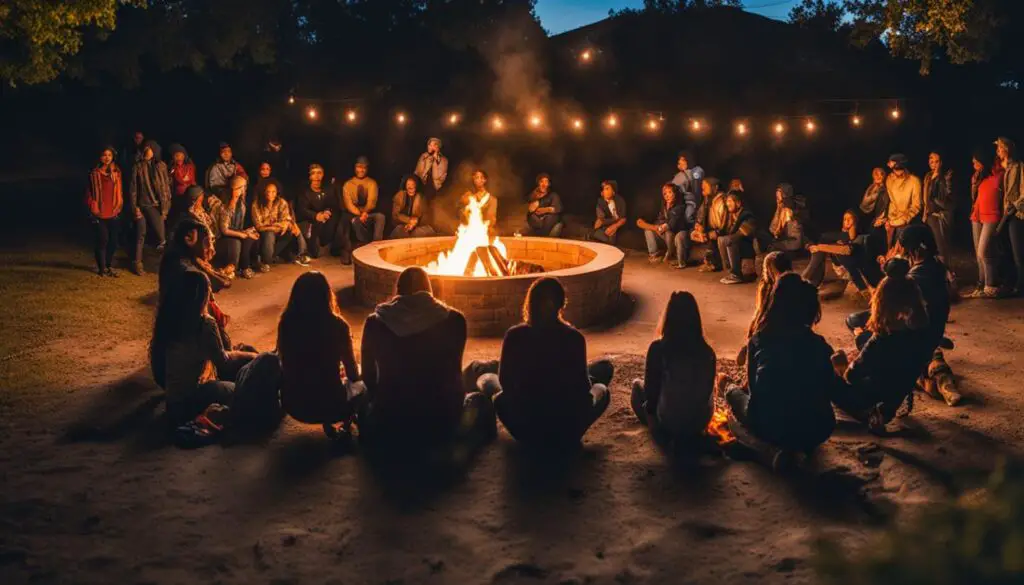Welcome to our comprehensive guide on essential youth group questions. As youth group leaders and mentors, we understand the importance of engaging, inspiring, and understanding the perspectives of young people. Meaningful discussions can spark personal growth, foster connections, and deepen faith. In this guide, we will provide you with a range of thought-provoking and fun questions that will help create a welcoming and inclusive atmosphere within your youth group.
Key Takeaways:
- Asking youth group questions is crucial for engaging, inspiring, and understanding young people.
- Meaningful discussions can spark personal growth, foster connections, and deepen faith.
- Thought-provoking and fun questions create a welcoming and inclusive atmosphere within the youth group.
- Icebreaker questions are great for building connections and fostering a positive group dynamic.
- Deep questions encourage introspection and meaningful conversations among young people.
Questions About Identity and Self-Reflection
Helping young people explore their identity and engage in self-reflection is crucial for their personal growth and development. By asking thought-provoking questions, we can encourage them to delve deeper into their sense of self and understand their unique qualities and aspirations. Here are some questions that can guide meaningful conversations:
1. What words or phrases would you use to describe yourself?
Encourage youths to think about their personality traits, strengths, and values. This question can help them identify their positive qualities and build self-esteem.
2. How do you handle challenges and setbacks?
Discussing how young people cope with adversity promotes resilience and self-awareness. Encourage them to share strategies they use to overcome obstacles and grow from difficult experiences.
3. What external factors influence your self-perception?
Explore how societal norms, media, and peer influence shape young people’s sense of self. Help them recognize the impact of external factors and develop a positive self-image.
4. In what areas do you feel the need for personal growth?
Encourage youths to reflect on their areas for improvement, setting goals for self-improvement. This question can ignite self-motivation and inspire them to strive for personal growth.
By posing these questions, we can create a safe space for young people to explore their identity, boost their self-confidence, and foster a sense of purpose. Let’s empower them to embrace self-reflection as a powerful tool for personal development and self-discovery.

| Question | Objective |
|---|---|
| What words or phrases would you use to describe yourself? | To identify and appreciate personal qualities and strengths. |
| How do you handle challenges and setbacks? | To promote resilience and self-awareness in the face of adversity. |
| What external factors influence your self-perception? | To explore the impact of societal norms and peer influence on self-image. |
| In what areas do you feel the need for personal growth? | To ignite self-motivation and encourage setting goals for self-improvement. |
Table: Questions for Identity and Self-Reflection
Exploring Faith and Spirituality
Faith and spirituality play a vital role in the lives of young people. It provides them with a sense of purpose, guidance, and a deeper understanding of their place in the world. Asking thought-provoking questions about faith and spirituality can help nurture their beliefs, encourage reflection, and foster a stronger connection with their spirituality. In this section, we will explore a range of questions that delve into the core of faith, encouraging young people to explore and deepen their relationship with their beliefs.
One aspect of faith that often sparks curiosity and contemplation is the purpose and relevance of the Bible in our lives. By asking questions such as, “What do you believe is the purpose of the Bible?” or “How has the Bible impacted your faith journey?”, we can encourage young people to dive deeper into their understanding of Scripture and its significance. This will not only enhance their knowledge but also strengthen their personal connection with the teachings of Christianity.
In addition to discussing the Bible, spiritual questions can also revolve around personal experiences with God. Encouraging young people to share their encounters with the divine, whether it be through prayer, signs, or moments of profound connection, can deepen their understanding of spirituality and strengthen their belief in a higher power. Questions like, “Can you share a personal experience where you felt a strong presence of God?” or “How does prayer impact your spiritual journey?” can open up meaningful conversations and allow for the expression of personal beliefs.

Asking spiritual questions can also help young people reflect on their faith in relation to their daily lives. By exploring topics such as the relevance of Christianity in contemporary society or the role of faith in making ethical decisions, we can guide young people in applying their beliefs to real-world situations. This encourages them to think critically, engage with their faith on a practical level, and develop a deeper understanding of how their spirituality influences their actions.
By creating a safe and open space for young people to explore their faith and spirituality through meaningful questions, we can support their personal growth, inspire their spiritual journeys, and empower them to live out their beliefs in a way that is authentic and meaningful to them.
Addressing Social Issues
Social issues play a vital role in the lives of young people, shaping their perspectives, values, and actions. Engaging in discussions on social topics not only helps them understand the world around them but also empowers them to contribute positively to society. By asking thought-provoking questions about social issues, youth groups can foster empathy, critical thinking, and a sense of responsibility in their members.
Here are some essential questions that can initiate discussions on social topics:
- How can we raise awareness about poverty and homelessness in our community?
- What actions can we take as individuals and as a group to combat bullying?
- How can we promote equality and inclusivity in our society?
- What role can the church play in addressing social justice issues?
- How can we use our voices to advocate for positive change in our community?
These questions provide a starting point for exploring social issues and encouraging young people to think critically about the world they live in. By facilitating open and respectful discussions around these topics, youth groups can help develop informed and compassionate individuals who are committed to making a difference.
Table: Sample Questions about Social Issues
| Question | Description |
|---|---|
| How can we address poverty and inequality in our community? | This question prompts a discussion on ways to tackle socio-economic disparities and improve the lives of marginalized individuals. |
| What are some potential solutions to reduce environmental pollution? | This question encourages young people to think creatively about ways to protect the environment and promote sustainable living. |
| How can we promote inclusivity and acceptance of diverse identities? | By discussing this question, youth group members can explore strategies to create a welcoming and safe environment for all individuals. |
| What can we do as a group to support individuals experiencing mental health challenges? | This question highlights the importance of mental health awareness and ways to provide support and resources to those in need. |
Nurturing Healthy Relationships
Building healthy relationships with youth is a crucial aspect of youth group dynamics. By fostering a supportive and inclusive environment, young people can develop meaningful connections that contribute to their personal growth and overall well-being. To facilitate this process, here are some thought-provoking questions that can help nurture healthy relationships in a youth group setting:
- What characteristics do you value most in a friend?
- How do you handle conflicts within your relationships?
- How do you effectively communicate your needs and boundaries in a friendship?
- How do you build trust and establish a sense of mutual support in your relationships?
These questions encourage young people to reflect on their own interpersonal skills and provide an opportunity to discuss strategies for building and maintaining healthy relationships. By exploring these topics, youth can gain insights into effective communication, empathy, and conflict resolution, empowering them to cultivate positive connections within their youth group and beyond.
Creating a Supportive Environment
In addition to asking meaningful questions, it is essential to create a welcoming and safe atmosphere within the youth group. Encourage active listening, empathy, and respect for diverse perspectives. Foster an environment where young people feel comfortable sharing their thoughts and experiences without fear of judgment. By promoting inclusivity and understanding, youth can develop a sense of belonging and form genuine connections with their peers.
“A true friend is someone who sees the pain in your eyes while everyone else believes the smile on your face.” – Unknown
This quote serves as a reminder of the importance of authentic connections and the role of a supportive community in the lives of young people. By asking thoughtful questions and fostering a welcoming environment, youth groups can create a space for young people to build and nurture healthy relationships that can positively impact their lives for years to come.
| Benefits of Nurturing Healthy Relationships | Strategies for Building Healthy Relationships |
|---|---|
|
|
By nurturing healthy relationships, young people can experience numerous benefits, including increased self-esteem, improved well-being, and a stronger support network. Implementing strategies such as active listening, empathy, and respect for boundaries can help build and maintain these positive connections.
Encouraging Personal Growth and Goal-Setting
As young people navigate the challenges and opportunities of life, it is essential to foster an environment that encourages personal growth and goal-setting. By asking thought-provoking questions and providing guidance, youth group leaders can empower young individuals to explore their passions, identify their strengths, and set meaningful goals. These conversations create a platform for self-reflection, self-improvement, and personal development.
Goal-setting plays a crucial role in the journey of personal growth. It enables young people to envision their future, prioritize their aspirations, and take proactive steps towards achieving their dreams. By asking questions that inspire goal-setting, youth group leaders can guide participants to define their objectives, break them down into manageable tasks, and develop action plans that lead to success. Through this process, young individuals gain a sense of purpose, learn perseverance, and develop valuable life skills.
Table:
| Questions for Personal Growth and Goal-Setting |
|---|
| What are your long-term aspirations and dreams? |
| What steps can you take to work towards your goals? |
| How do you overcome obstacles that come your way? |
| Which areas of personal growth are important to you? |
| What motivates you to pursue your goals? |
By encouraging personal growth and goal-setting, youth group leaders empower young individuals to embrace their potential, cultivate resilience, and strive for excellence. These discussions foster a positive and growth-oriented mindset, helping participants build a strong foundation for their future endeavors.

Fostering Inclusivity in Youth Groups: Creating a Welcoming Atmosphere
In order to create a thriving and supportive youth group, it is crucial to foster an inclusive and welcoming atmosphere. This not only ensures that young people feel valued and accepted, but it also encourages active participation and meaningful connections within the group. By asking thought-provoking questions and addressing important topics, youth group leaders can promote inclusivity and create an environment where every member feels safe and supported.
One effective way to foster inclusivity is by encouraging open and honest discussions about diversity and acceptance. By asking questions that promote understanding and empathy, youth group leaders can help young people explore their own biases and challenge stereotypes. For example, questions like:
- How can we celebrate our differences and embrace diversity within our youth group?
- What steps can we take to create a safe space where everyone feels comfortable sharing their experiences and perspectives?
- How can we address and challenge stereotypes and prejudice within our community?
By posing these questions, youth group leaders can spark meaningful conversations about inclusivity and encourage young people to reflect on their own beliefs and behaviors. It is important to create an environment where all voices are heard and respected, fostering an atmosphere that values diversity and promotes unity.
| Benefits of fostering inclusivity in youth groups: | Importance of creating a welcoming atmosphere: |
|---|---|
|
|
In conclusion, fostering inclusivity in youth groups is essential for creating a welcoming atmosphere where young people can thrive and grow. By asking thoughtful questions and addressing important topics, youth group leaders can promote understanding, empathy, and acceptance. By embracing diversity and valuing every individual’s unique experiences and perspectives, youth groups can become transformative spaces where young people feel safe, supported, and inspired.
Exploring Christian Living
When it comes to nurturing the faith of young people, exploring Christian living is essential. By engaging in discussions on Christian values and encouraging introspection, youth groups can help young individuals develop a deeper understanding of their faith and its practical application in their lives.
One important aspect of Christian living is following Jesus as a role model. Through thought-provoking questions, youth groups can inspire young people to reflect on how they can emulate Jesus’ teachings in their daily lives. This can include discussions on the importance of love, forgiveness, compassion, and serving others as they navigate various challenges and decisions.
Sharing faith experiences is another significant aspect of Christian living. By creating a safe and supportive environment, youth groups can encourage young individuals to openly discuss their personal encounters with God and the ways in which their faith has impacted their lives. This not only promotes a sense of connectedness and empathy within the group but also allows young people to strengthen their faith through shared stories and testimonies.
| Key Topics for Exploring Christian Living | Discussion Questions |
|---|---|
| Following Jesus | 1. How can we actively apply Jesus’ teachings in our everyday lives? |
| Sharing Faith | 2. Can you share a personal experience where your faith has been a source of strength or guidance? |
| The Importance of Church | 3. What role does the church community play in supporting and nurturing our faith? |
| Engaging in Prayer | 4. How can we deepen our prayer life and make it a more meaningful practice? |
| Serving Others | 5. In what ways can we actively serve and make a positive impact in our community? |
“Christian living is not just about attending church or following certain rules. It is a journey of faith, where we strive to love and serve others, just as Jesus taught us. By exploring the practical aspects of our faith, we can deepen our understanding of what it means to be a Christian and live out our beliefs in our daily lives.”
Through meaningful discussions on Christian living, youth groups have the opportunity to equip young people with the knowledge and understanding necessary to live out their faith authentically. By fostering a welcoming and inclusive atmosphere, youth leaders can encourage open dialogue and support young individuals in their journey of faith, empowering them to make a positive impact in the world around them.

Developing Meaningful Connections
In a youth group, building friendships and fostering connections among members is essential. These relationships provide support, encouragement, and a sense of belonging for young people as they navigate the challenges of adolescence. To cultivate these meaningful connections, it’s important to ask questions that promote deeper understanding and empathy. By delving into shared experiences, vulnerabilities, and perspectives, youth group members can forge lasting bonds that enrich their lives.

Finding Common Ground
One effective way to develop connections within a youth group is to encourage members to find common ground. By asking questions that highlight shared interests, hobbies, or experiences, young people can discover similarities that help break down barriers and build connections. For example, you could pose questions like:
- What is your favorite book or movie, and why?
- Have you ever faced a challenge that you felt was insurmountable? How did you overcome it?
- What are your dreams and aspirations for the future?
As youth group members discuss their answers, they can find commonalities that create a sense of camaraderie and understanding.
Creating a Safe and Supportive Environment
A vital aspect of developing meaningful connections is fostering a safe and supportive environment where young people feel comfortable opening up and sharing their thoughts and feelings. By asking questions that encourage vulnerability and empathy, youth group leaders can create a space where members can be authentic and find acceptance. Some questions that can facilitate this include:
“What is one challenge you’re currently facing, and how can we support you?”
“Share a time when someone’s kindness made a significant impact on your life.”
“How can we foster a more inclusive and supportive atmosphere within our youth group?”
By actively listening and demonstrating empathy, youth group leaders can cultivate an environment that encourages deep connections and personal growth.
Participating in Meaningful Activities
Beyond asking thought-provoking questions, engaging in activities that promote bonding and teamwork can greatly enhance connections within a youth group. By participating in community service projects, retreats, or team-building exercises, young people have the opportunity to collaborate, communicate, and understand one another on a deeper level. These shared experiences foster a sense of unity and camaraderie that can strengthen connections and create lasting memories.
| Activity | Description |
|---|---|
| Service Project | Volunteering together for a local charity or organizing a fundraising event to support a cause helps youth group members bond while making a positive impact in the community. |
| Retreat | A retreat offers a space for reflection, self-discovery, and connection. Through group activities, discussions, and shared experiences, young people can grow closer and deepen their connections. |
| Team-Building Exercises | Engaging in challenges that require teamwork and problem-solving promotes collaboration, trust, and communication within the youth group. |
By incorporating these activities into the youth group’s agenda, leaders can provide opportunities for young people to develop meaningful connections that extend beyond the regular meeting times.
Reflecting on Scripture and Biblical Characters
Exploring the depth and wisdom of the Bible is a crucial aspect of youth group discussions. By encouraging young people to reflect on Scripture and biblical characters, we can help them develop a stronger connection with their faith and deepen their understanding of its relevance to their lives. Through thoughtful exploration, they can find inspiration, guidance, and valuable life lessons that will shape their journey of faith.
When discussing the Bible with youth, it is important to create an environment that encourages open dialogue and allows for personal interpretations. By asking questions that provoke reflection and introspection, we can help young people uncover their own insights and connections to the Scriptures. This can lead to profound discussions that not only strengthen their individual faith but also foster a sense of shared community and understanding within the youth group.
One way to initiate these discussions is by encouraging the youth to share their favorite Bible stories and explain why those particular stories resonate with them. This allows them to not only reflect on the messages conveyed in these stories but also share personal experiences or challenges that align with the themes presented. By doing so, they can find comfort and guidance in the shared experiences of biblical characters and discover how their own lives can be influenced by these stories.
Exploring Biblical Characters with Youth
In addition to discussing favorite stories, it is also valuable to explore specific biblical characters with the youth. By asking questions that delve into the mindset, struggles, and triumphs of these characters, we can help the youth relate their own experiences to those of individuals in the Bible. This fosters a deeper understanding of the human condition and the shared challenges faced by people of faith throughout history.
Here are some questions that can prompt fruitful discussions about biblical characters:
- What character from the Bible do you identify with the most, and why?
- What challenges did this character face, and how did they overcome them?
- What life lessons can we learn from this character’s story?
- How can the experiences of this character inspire us in our own faith journey?
By reflecting on the lives of biblical characters, young people can gain insights into their own struggles, strengths, and potential for growth. This exploration of Scripture helps them see their own stories within the larger narrative of faith, empowering them to live out their beliefs with conviction and purpose.
| Biblical Characters | Characteristics | Lessons Learned |
|---|---|---|
| Moses | Leadership, faith, humility | The power of perseverance, trusting in God’s plan, and leading with humility |
| David | Courage, repentance, worship | The importance of a repentant heart, trusting in God’s forgiveness, and finding strength through worship |
| Esther | Courage, faith, obedience | The significance of standing up for what is right, trusting in God’s guidance, and being obedient to His call |
As we guide the youth in reflecting on Scripture and biblical characters, it is important to emphasize that the Bible is not just a historical document, but a living and relevant source of wisdom that can powerfully impact their lives. By encouraging genuine engagement with the Scriptures, we can help young people discover the transformative power of God’s Word and cultivate a lasting and meaningful relationship with Him.
Enhancing Group Dynamics and Interaction
Building a strong sense of community and fostering positive interactions within a youth group is essential for creating an engaging and inclusive environment. Icebreaker questions and activities can be powerful tools to enhance group dynamics and promote interaction among young people. By encouraging open and meaningful conversations, these icebreakers can help break down barriers, build connections, and create a safe space for everyone to share and learn from one another.
Here are some icebreaker questions that can be used to promote group interaction:
- What is one interesting fact about yourself that most people don’t know?
- If you could visit any place in the world, where would you go and why?
- What is your favorite movie or TV show and why?
- What is one goal or dream you have for the future?
These questions are designed to spark conversation and encourage participants to share their thoughts, experiences, and aspirations. Remember to create a welcoming and judgment-free atmosphere where everyone feels comfortable expressing themselves. By facilitating these icebreaker activities, youth group leaders can set the tone for a positive and collaborative group dynamic that will enhance the overall experience for everyone.
Table: Icebreaker Questions for Group Interaction
| Question | Description |
|---|---|
| What is one interesting fact about yourself that most people don’t know? | This question encourages participants to share unique aspects of their lives, fostering curiosity and creating opportunities for further discussion. |
| If you could visit any place in the world, where would you go and why? | This question taps into participants’ travel aspirations and allows them to share their desires and motivations, potentially uncovering shared interests. |
| What is your favorite movie or TV show and why? | This question provides insight into participants’ entertainment preferences, opening up avenues for conversation and potential recommendations. |
| What is one goal or dream you have for the future? | This question prompts participants to think about their aspirations, fostering a sense of purpose and encouraging support and encouragement from the group. |
Conclusion
In conclusion, asking youth group questions is essential for engaging, inspiring, and understanding the perspectives of young people. By utilizing thought-provoking and fun questions, we can spark meaningful discussions that promote growth, connection, and faith development among youth. These questions play a crucial role in creating a welcoming and inclusive atmosphere where young people can explore their identity, reflect on their beliefs, address social issues, nurture healthy relationships, and set personal goals.
As we encourage young people to reflect on their identity and self-reflection, it helps them develop a stronger sense of self-esteem and personal growth. Exploring faith and spirituality allows them to deepen their relationship with God and find relevance in their Christian journey. Addressing social issues empowers them to make a positive impact in their communities, and nurturing healthy relationships teaches important life skills.
By asking questions about personal growth and goal-setting, we inspire young people to overcome challenges, set realistic expectations, and strive for their dreams. Creating a welcoming youth group culture ensures that everyone feels included, safe, and supported. Exploring Christian living and reflecting on Scripture helps young people connect their faith to their everyday lives.
Ultimately, asking youth group questions fosters an environment where young people can connect, grow, and thrive. It is through these conversations and discussions that we can guide them on their journey, inspire them to live out their Christian values, and equip them to make a positive impact in the world. Let us continue to engage in open and meaningful conversations, recognizing the importance of youth voices and the power of connection within youth groups.
FAQ
What are some essential youth group questions to ask youths?
Essential youth group questions may include topics such as identity, faith, social issues, relationships, personal growth, group dynamics, and Scripture exploration.
What are some questions about identity and self-reflection for young people?
Questions about identity and self-reflection may include inquiries about self-esteem, personal strengths, areas for growth, and the impact of external factors on self-perception.
How can we explore faith and spirituality with young people?
You can explore faith and spirituality by discussing topics such as the purpose of the Bible, the relevance of Christianity to their lives, the role of prayer, and personal experiences with God.
What are some questions that address social issues and encourage engagement?
Questions that address social issues may cover topics such as poverty, societal anger, bullying, inequality, and the role of the church in addressing social justice.
How can we nurture healthy relationships within a youth group?
Nurturing healthy relationships may involve discussing topics such as friendship qualities, conflict resolution, communication, and the importance of trust and support in relationships.
What are some questions that encourage personal growth and goal-setting?
Questions that inspire personal growth and goal-setting may explore topics such as dealing with stress and pressure, setting realistic expectations, pursuing long-term goals, and identifying motivators and demotivators.
How can we create a welcoming youth group culture?
Creating a welcoming youth group culture involves addressing topics such as making new members feel welcome, combating cliques, addressing gossip, and fostering a safe and supportive environment.
How can we explore Christian living with young people?
You can explore Christian living by discussing topics such as following Jesus, sharing faith, the importance of church, engaging in prayer, and serving others.
What are some ways to develop meaningful connections among youth group members?
Developing meaningful connections may involve discussing topics such as sharing vulnerable stories, understanding different perspectives, supporting one another, and participating in activities that promote bonding.
How can we reflect on Scripture and biblical characters with young people?
You can reflect on Scripture and biblical characters by prompting discussions on the relevance of the Bible, favorite Bible stories, identifying with biblical characters, and the impact of faith on their lives.
What are some icebreaker questions and activities to enhance group dynamics?
Icebreaker questions and activities can help build connections, break the ice, and foster a positive and inclusive group atmosphere. These can include fun and engaging questions that facilitate interaction and bonding.


https://ddnews.co.kr/blog/2021/08/23/카카오톡-pc버전-다운로드/
you’re really a just right webmaster. The site loading speed is incredible.
It sort of feels that you are doing any distinctive trick.
In addition, The contents are masterpiece. you have performed a fantastic job
in this subject!